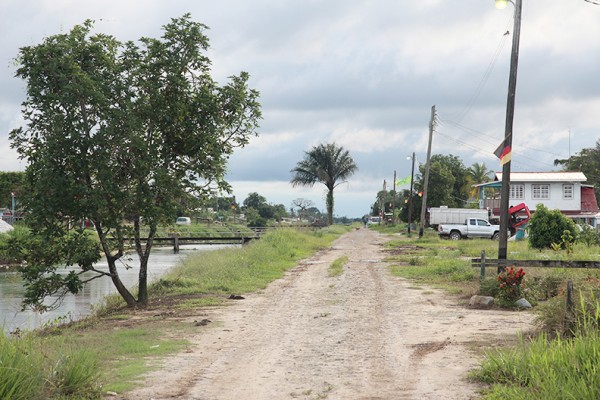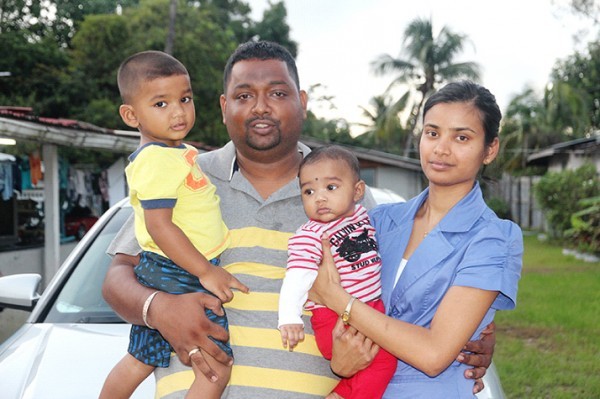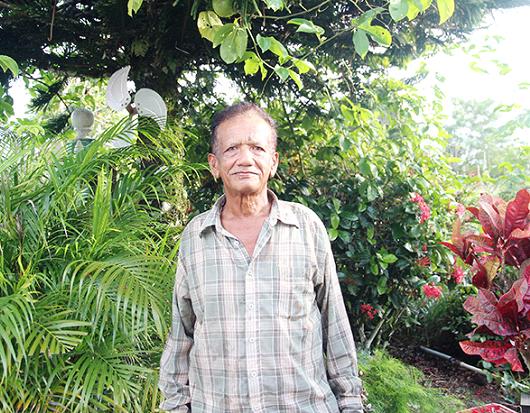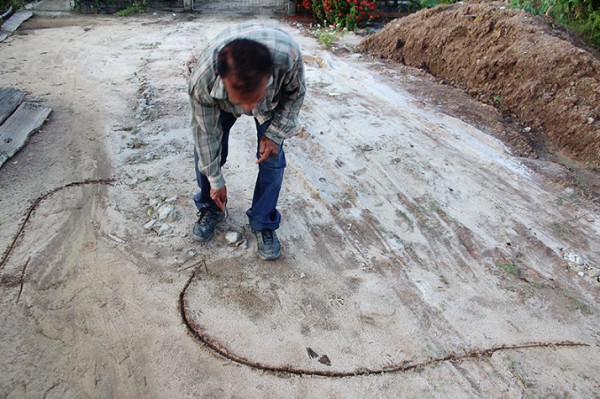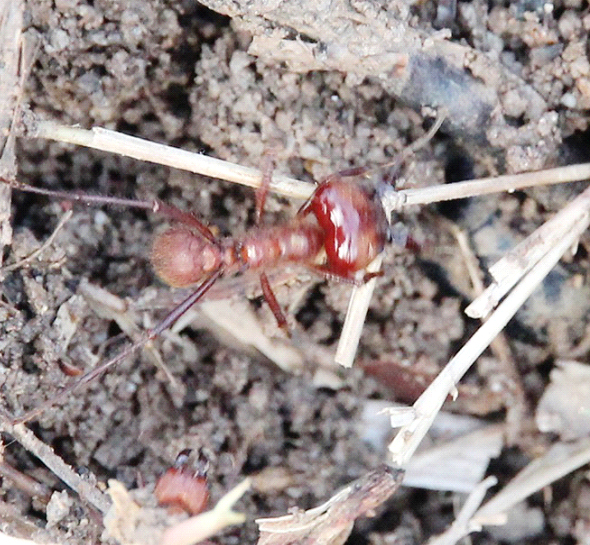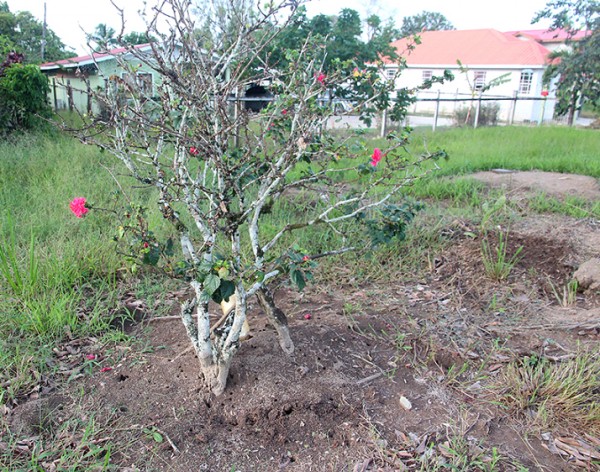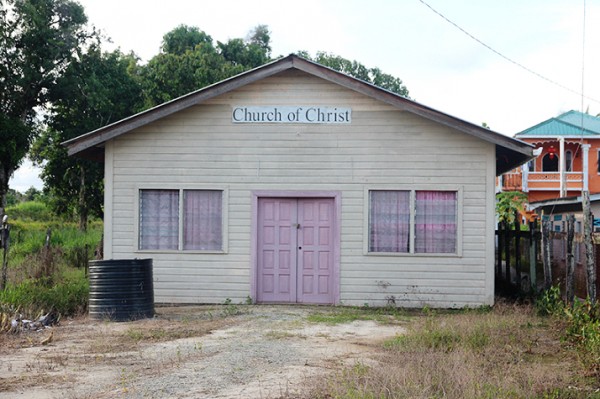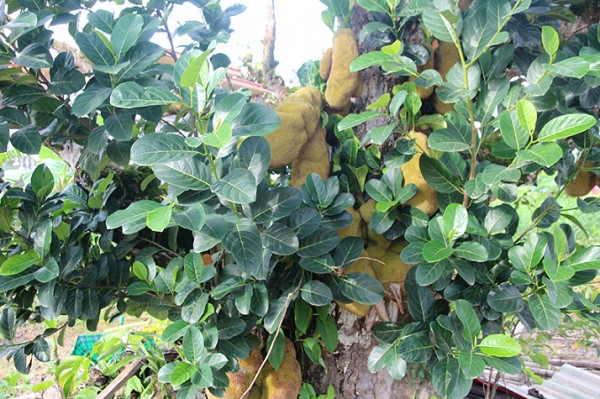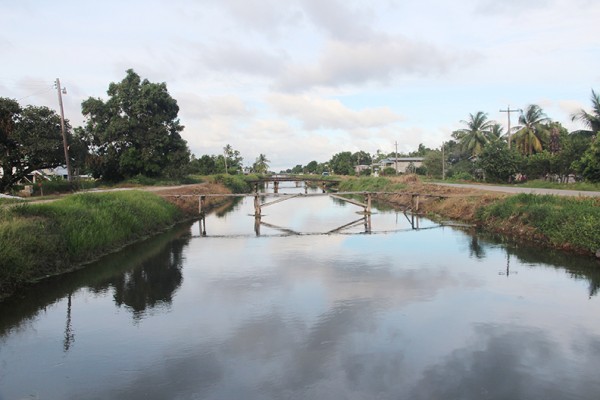Mon Bijou is a discreet, little village in Canal Number One, West Bank Demerara.
Upon crossing the Demerara Harbour Bridge you turn left and travel until you cross the concrete bridge just before the Bagotville junction then turn right into Canal Number One. Three miles into Canal Number One you come upon Mon Bijou, a village situated on a dam running parallel to the public road.
Mon Bijou is French for ‘My Jewel’, but villagers say the village is of Dutch origin just like as Vrede en Vriendschap situated two villages away. But unlike the residents of Vrede en Vriendschap, instead of planting flowering plants along the roadway, Mon Bijou residents have planted fruit trees. One tree was laden with giant jackfruits all the way to the bottom, while a huge mango tree on the road was decorated all over with its red mangoes. Enormous akushi (leaf-cutter) ants’ nests alive with the tiny creatures dotted the landscape.
Though Mon Bijou seems a place of giants, the villagers are humble and friendly. One such person is retired soldier, Samuel Williams.
Williams was born in 1943 in Mes Delices, the village almost opposite Mon Bijou. He attended the Macgillivray Primary School further down in Canal Number One. When he was 21 years old, he moved with his parents to live at Mon Bijou. Williams did studies in collaboration with Wolsey Hall Oxford College based in England and in 1966 he joined the Guyana Defence Force, just a few months after Guyana would have gained its independence. Through the army he was given the opportunity to study at the University of Guyana for two years (1973-1975) graduating with a Diploma in Public Health (RSH) Royal Society for the promotion of Health.
Williams also had the privilege of studying in Jamaica and in 1978 he wrote the RSH examinations for Meat and other Foods. Through an exchange program a few cadets of the British Army came to Guyana to learn how to survive in the forest while Williams and other cadets stayed at a military base in England to study the purification of water.
The 72-year-old retiree says he’s grateful to have worked under the control of President David Granger, while he was chief of staff of the GDF, and fellow senior officer Lt Colonel Joe Harmon, who is now Minister of State in the Ministry of the Presidency.
Williams, who attended the inauguration ceremony on May 26, said he always has great respect for the senior ranks and wanted to witness the prestigious moment. “It was marvellous. It was extraordinary,” he enthused.
Williams served for 22 years, leaving the army with the rank of Warrant Officer Class One (the highest non-commissioned rank in the army).
Apart from being a retired soldier he’s also a retired Public Health Officer. From 1994 – 2013, Williams voluntarily served the communities in the Canal Number One Polder as a village councillor at the NDC, assisting with petty matters such as trying to keep the peace among villagers. At present, he does valuation of properties and architectural drawings—other skills he learned while in the army—but he mostly enjoys taking care of his flowering plants and fruit trees.
According to the elderly man, back in the 60s there was no road, only a muddy track through the bushes. There was also no electricity so it was the norm to study with gas lamps. This is not the case today and Mon Bijou resident live in relative comfort.
There is no need for residents to go looking for vegetables to buy since they have their own farms. The grocery truck comes along the public road every other day.
“This is a quiet area,” Williams said. “Mon Bijou is a quiet farming community. Everybody who lives here owns an average of 6-15 acres of agricultural lands at the back of their houses,” he said. “We cultivate plantain, sugar cane, banana, ground provision and permanent crops [like mangoes and oranges]. Most villagers are Indo-Guyanese and each person is independent since they have their farmlands. Most persons have their own vehicles and when we have problems we try to help each other out,” he said.
Next door, Williams’s neighbours, Rajendradat Lall aka Ganesh and his wife Raywattie Balkaran live with their two sons, Manav and Aryan. Lall has been living in Mon Bijou for over 17 years. He recalled that when he first arrived, Williams was his only close neighbour.
Lall attended the West Demerara Secondary School then went on to study for 3 years at the Art Williams and Harry Wendt Aeronautical Engineering School at Ogle. Like his neighbour, he chose a career in the GDF and has been an avionics engineer in the army for the past five years.
“When I came here to live we used the black water from the trench in the nearby village to bathe and used the rain water to cook and drink,” Lall said. “Two years after I came here we got pipelines in our yards.”
Unlike his neighbours, he does not farm in his spare time, but does electrical repairs in a little building behind his house. Raywattie works at Diamond, East Bank Demerara and at home she sells in their little boutique.
Lall said, “Most of the neighbours are friendly. We get along well. We don’t have crimes here. I like living here.”
Both Williams and Lall said they were familiar with the ‘land master’. Williams said, “It is rumoured that a snake rules the backdam. We call it the land master and when it crawls it shakes the backdam. They average the snake’s about 1ft in diameter and 20ft in length.”
Williams said he’s never seen it, but claims to have seen its tracks which seem to go on forever leaving flattened grass where it would have crossed.
Lall said he’s seen it a few times. “Every village has a land master, once it was ruled by the Dutch. Ours is a snake. It’s about 1ft in diameter, jet black in colour with a yellow belly. Everybody’s under the impression that it’s the land master. If you harm it, evil will follow you. It protects the land.”

